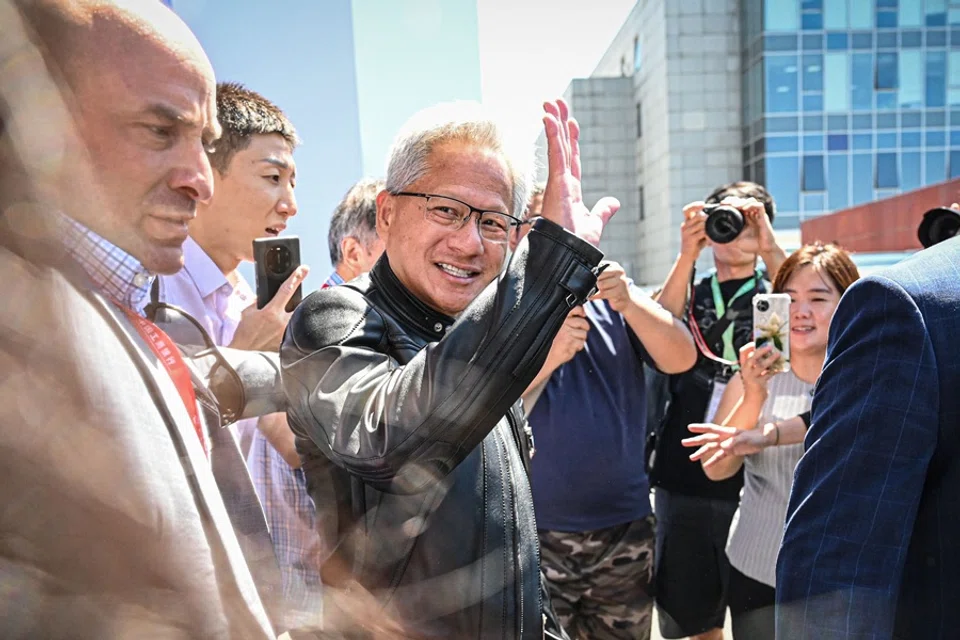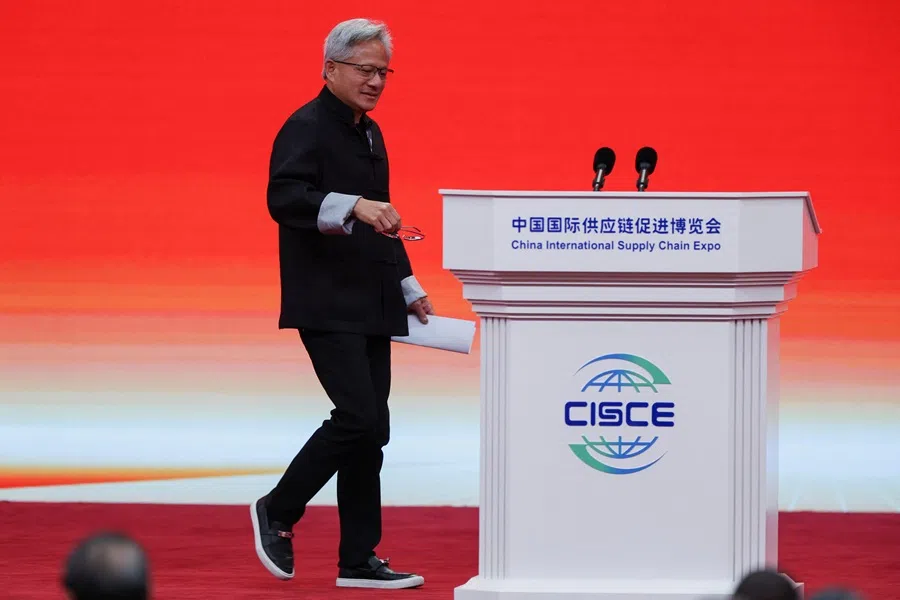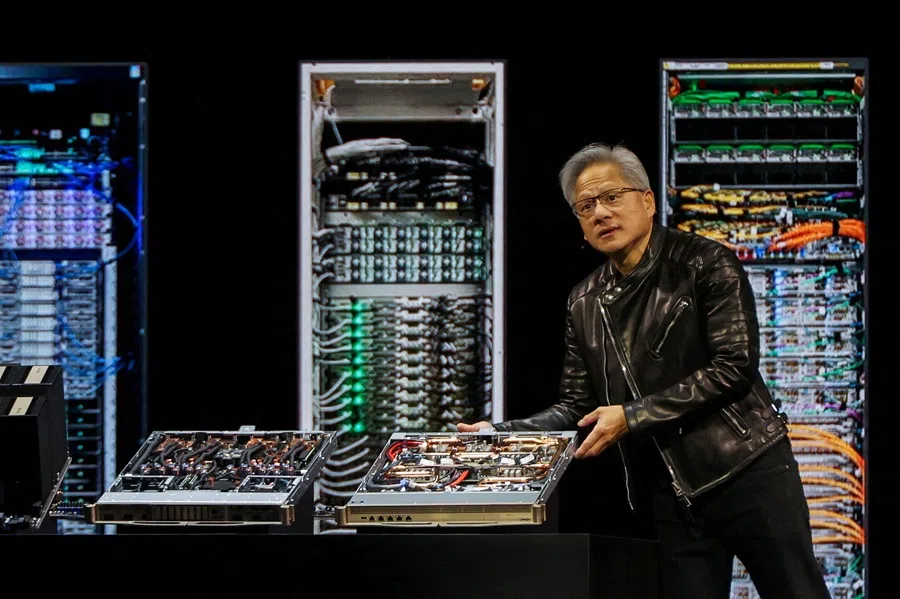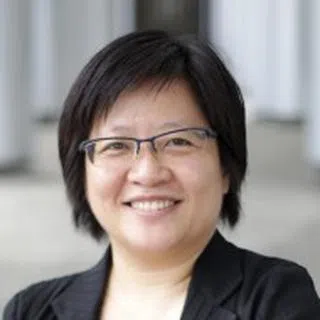Jensen Huang: The chip diplomat
Though Nvidia CEO Jensen Huang certainly has his work cut out for him as he attempts to steer Nvidia through a geopolitical storm, he is navigating the situation with surprising diplomatic finesse. Will he succeed? Lianhe Zaobao associate editor Han Yong Hong discusses the situation.

Nvidia CEO Jensen Huang recently visited China for the third time in six months. At the third China International Supply Chain Expo on 16 July, he ditched his signature black leather jacket for a traditional Tang suit and spoke a few words in Chinese, showing much respect for the host country.
During this visit, Huang again praised Chinese entrepreneurs for their innovative spirit, wealth of talent and open-source AI culture. He also shared a photo with Xiaomi founder Lei Jun, skilfully launching a charm offensive that no doubt helped dial down any nerves — or as Huang put it, “jian jing” (减惊) — among the Chinese audience.
The impact of his business decisions and actions extends beyond the fate of Nvidia’s empire, and also shapes the global AI landscape.
Jensen Huang: unofficial diplomat?
The term jian jing (减惊) was a humorous, accidental coinage by Huang during this trip, and it brought a smile to many faces. At the opening ceremony of the China International Supply Chain Expo, Huang spoke a few words in Mandarin for the first time in a public speech. He explained that he grew up in the US, hinting at his limited Chinese, and said: “So now I’m very jian jing — very nervous,” mispronouncing jinzhang (紧张, meaning nervous) as jian jing.
Rather than hurting his public image, the slip seemed to increase his appeal. As an experienced business diplomat, Huang clearly recognises that imperfect spoken Chinese can actually come across as sincere.
As Huang manoeuvres his way through the China-US chip war, American commentators have long noted that the 62-year-old is more than just a successful entrepreneur or tech mogul — he has become a geopolitical superstar. Huang’s activities in China and the US carry a clear quasi-diplomatic tone and subtly convey messages. The impact of his business decisions and actions extends beyond the fate of Nvidia’s empire, and also shapes the global AI landscape.

His unique role stems from Nvidia’s dominance in the global AI chip market. As Huang said in his speech, “Today, AI is fundamental infrastructure, like electricity and the internet… AI will be central to every industry, company, product and service.”
Nvidia’s unmatched AI graphics processing unit computing power has made it a magnet for countries worldwide — from China and the US to the Gulf states — propelling the company to become the first listed company with a market capitalisation surpassing US$4 trillion.
Navigating the unpredictable chip war
However, this special status also comes with huge political and economic risks. For one, Nvidia’s China business experienced dramatic ups and downs over the past three years. In 2022, to circumvent export restrictions imposed by the Biden administration, Nvidia developed a less-advanced version of its chips — the H20 — specifically for the Chinese market.
But when Donald Trump returned to the White House this year, his administration tightened export controls further in April, extending the ban to include the H20, almost paralysing Nvidia’s China operations. As a result, the company was forced to write down US$4.5 billion in inventory losses, with potential revenue losses reaching as high as US$10.5 billion.
This week, he announced in Beijing that the US government lifted the ban on the export of the H20 chip, and even expressed hopes to export more advanced chips than the H20 to China.
In response, Huang immediately travelled to China, meeting with Chinese Vice-Premier He Lifeng — as he did again on this trip — in an effort to reassure one of Nvidia’s largest markets and buyers.

In the last ten days, there has been another twist. On 10 July, Huang visited the White House to meet with Trump before departing for China the next day. This week, he announced in Beijing that the US government lifted the ban on the export of the H20 chip, and even expressed hopes to export more advanced chips than the H20 to China.
The unpredictable nature of Nvidia’s H20 chip exports to China is a reflection of the high volatility when it comes to the company’s operations and its strategy for China in the current geopolitical environment.
The back-and-forth on chip exports to China from the past two US administrations — banning, then unbanning — underscored deteriorating China-US relations, which were further complicated recently by the new factor of rare earth negotiations.
Nvidia caught in the crossfire of geopolitical tensions
Presently, the control of chip and rare earth exports has become a tactical tool in the China-US tussle, and China has also vigorously developed its own Huawei Ascend chips. All of these suggest that Nvidia will remain in a delicate position for the long term. Any further escalation in China-US issues, such as those concerning the Taiwan Strait, could see chips being used as tactical tools in this tussle.
Huang is acutely aware that Nvidia’s business with China hinges on the changes in China-US relations. It is an undeniable reality, and Huang must carefully tread this tightrope to ensure that he is of value to both the US and China.
Despite receiving Trump’s blessing to “have a great trip” before his departure, other players in US politics continue to press him relentlessly. On 11 July, two US senators — Republican Jim Banks and Democrat Elizabeth Warren — issued a joint letter warning Huang against meeting with collaborators of the Chinese military and intelligence units, as well as the Chinese companies on the Entity List.
In the US, Huang represents a faction of elites who advocate for maintaining commercial links with China in order to ensure American global influence and technological leadership...

In the US, Huang represents a faction of elites who advocate for maintaining commercial links with China in order to ensure American global influence and technological leadership, which stands in contrast with the hawks who favour isolating China. As a Taiwanese-American, Huang’s decisions are primarily rooted in business rationality. Amid a highly polarised environment, however, the pro-engagement faction faces ongoing difficulties.
Nvidia’s chip exports to China are caught in a “ban and unban” cycle. All Huang can do is to continue fortifying Nvidia’s technological “moat”, and to accumulate goodwill as much as possible in this perilous environment. Just on this point, Huang has performed outstandingly; his resilience as an entrepreneur in challenging geopolitical circumstances is admirable.
This article was first published in Lianhe Zaobao as “黄仁勋行走在中美博弈中的高空钢索”.





